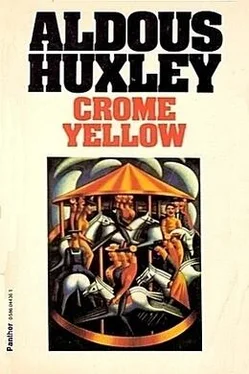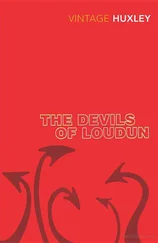Denis held open the little iron gate for his companion. "It's like passing from a cloister into an Oriental palace," he said, and took a deep breath of the warm, flower–scented air. "'In fragrant volleys they let fly…' How does it go?
"'Well shot, ye firemen! Oh how sweet And round your equal fires do meet; Whose shrill report no ear can tell, But echoes to the eye and smell…'"
"You have a bad habit of quoting," said Anne. "As I never know the context or author, I find it humiliating."
Denis apologized. "It's the fault of one's education. Things somehow seem more real and vivid when one can apply somebody else's ready–made phrase about them. And then there are lots of lovely names and words—Monophysite, Iamblichus, Pomponazzi; you bring them out triumphantly, and feel you've clinched the argument with the mere magical sound of them. That's what comes of the higher education."
"You may regret your education," said Anne; "I'm ashamed of my lack of it. Look at those sunflowers! Aren't they magnificent?"
"Dark faces and golden crowns—they're kings of Ethiopia. And I like the way the tits cling to the flowers and pick out the seeds, while the other loutish birds, grubbing dirtily for their food, look up in envy from the ground. Do they look up in envy? That's the literary touch, I'm afraid. Education again. It always comes back to that." He was silent.
Anne had sat down on a bench that stood in the shade of an old apple tree. "I'm listening," she said.
He did not sit down, but walked backwards and forwards in front of the bench, gesticulating a little as he talked. "Books," he said—"books. One reads so many, and one sees so few people and so little of the world. Great thick books about the universe and the mind and ethics. You've no idea how many there are. I must have read twenty or thirty tons of them in the last five years. Twenty tons of ratiocination. Weighted with that, one's pushed out into the world."
He went on walking up and down. His voice rose, fell, was silent a moment, and then talked on. He moved his hands, sometimes he waved his arms. Anne looked and listened quietly, as though she were at a lecture. He was a nice boy, and to–day he looked charming—charming!
One entered the world, Denis pursued, having ready–made ideas about everything. One had a philosophy and tried to make life fit into it. One should have lived first and then made one's philosophy to fit life…Life, facts, things were horribly complicated; ideas, even the most difficult of them, deceptively simple. In the world of ideas everything was clear; in life all was obscure, embroiled. Was it surprising that one was miserable, horribly unhappy? Denis came to a halt in front of the bench, and as he asked this last question he stretched out his arms and stood for an instant in an attitude of crucifixion, then let them fall again to his sides.
"My poor Denis!" Anne was touched. He was really too pathetic as he stood there in front of her in his white flannel trousers. "But does one suffer about these things? It seems very extraordinary."
"You're like Scogan," cried Denis bitterly. "You regard me as a specimen for an anthropologist. Well, I suppose I am."
"No, no," she protested, and drew in her skirt with a gesture that indicated that he was to sit down beside her. He sat down. "Why can't you just take things for granted and as they come?" she asked. "It's so much simpler."
"Of course it is," said Denis. "But it's a lesson to be learnt gradually. There are the twenty tons of ratiocination to be got rid of first."
"I've always taken things as they come," said Anne. "It seems so obvious. One enjoys the pleasant things, avoids the nasty ones. There's nothing more to be said."
"Nothing—for you. But, then, you were born a pagan; I am trying laboriously to make myself one. I can take nothing for granted, I can enjoy nothing as it comes along. Beauty, pleasure, art, women—I have to invent an excuse, a justification for everything that's delightful. Otherwise I can't enjoy it with an easy conscience. I make up a little story about beauty and pretend that it has something to do with truth and goodness. I have to say that art is the process by which one reconstructs the divine reality out of chaos. Pleasure is one of the mystical roads to union with the infinite—the ecstasies of drinking, dancing, love–making. As for women, I am perpetually assuring myself that they're the broad highway to divinity. And to think that I'm only just beginning to see through the silliness of the whole thing! It's incredible to me that anyone should have escaped these horrors."
"It's still more incredible to me," said Anne, "that anyone should have been a victim to them. I should like to see myself believing that men are the highway to divinity." The amused malice of her smile planted two little folds on either side of her mouth, and through their half–closed lids her eyes shone with laughter. "What you need, Denis, is a nice plump young wife, a fixed income, and a little congenial but regular work."
"What I need is you." That was what he ought to have retorted, that was what he wanted passionately to say. He could not say it. His desire fought against his shyness. "What I need is you." Mentally he shouted the words, but not a sound issued from his lips. He looked at her despairingly. Couldn't she see what was going on inside him? Couldn't she understand? "What I need is you." He would say it, he would—he would.
"I think I shall go and bathe," said Anne. "It's so hot." The opportunity had passed.
Mr. Wimbush had taken them to see the sights of the Home Farm, and now they were standing, all six of them—Henry Wimbush, Mr. Scogan, Denis, Gombauld, Anne, and Mary—by the low wall of the piggery, looking into one of the styes.
"This is a good sow," said Henry Wimbush. "She had a litter of fourteen.
"Fourteen?" Mary echoed incredulously. She turned astonished blue eyes towards Mr. Wimbush, then let them fall onto the seething mass of elan vital that fermented in the sty.
An immense sow reposed on her side in the middle of the pen. Her round, black belly, fringed with a double line of dugs, presented itself to the assault of an army of small, brownish–black swine. With a frantic greed they tugged at their mother's flank. The old sow stirred sometimes uneasily or uttered a little grunt of pain. One small pig, the runt, the weakling of the litter, had been unable to secure a place at the banquet. Squealing shrilly, he ran backwards and forwards, trying to push in among his stronger brothers or even to climb over their tight little black backs towards the maternal reservoir.
"There ARE fourteen," said Mary. "You're quite right. I counted. It's extraordinary."
"The sow next door," Mr. Wimbush went on, "has done very badly. She only had five in her litter. I shall give her another chance. If she does no better next time, I shall fat her up and kill her. There's the boar," he pointed towards a farther sty. "Fine old beast, isn't he? But he's getting past his prime. He'll have to go too."
"How cruel!" Anne exclaimed.
"But how practical, how eminently realistic!" said Mr. Scogan. "In this farm we have a model of sound paternal government. Make them breed, make them work, and when they're past working or breeding or begetting, slaughter them."
"Farming seems to be mostly indecency and cruelty," said Anne.
With the ferrule of his walking–stick Denis began to scratch the boar's long bristly back. The animal moved a little so as to bring himself within easier range of the instrument that evoked in him such delicious sensations; then he stood stock still, softly grunting his contentment. The mud of years flaked off his sides in a grey powdery scurf.
"What a pleasure it is," said Denis, "to do somebody a kindness. I believe I enjoy scratching this pig quite as much as he enjoys being scratched. If only one could always be kind with so little expense or trouble…"
Читать дальше











